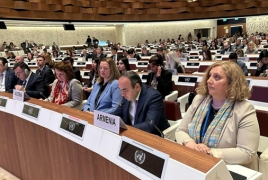
Armenia has ratified key international documents on gender equality and is aligning its national legislation with global obligations. Deputy Minister of Labor and Social Affairs Davit Khachatryan emphasized this during a United Nations international forum in Geneva titled “Advancing sustainable, inclusive, science-based and evidence-based solutions in the UNECE region for the 2030 Agenda and its Sustainable Development Goals.”
In his remarks, Khachatryan highlighted the importance of the 2024–2040 demographic improvement strategy, the 2025–2031 Employment Strategy, and the ongoing development of a gender policy strategy in Armenia.
The event brought together senior officials from various countries, policy experts, and stakeholders to discuss commitments under the 2030 Agenda and explore innovative, evidence-based solutions.
During the forum, Khachatryan noted that Armenia has consistently pursued the implementation of Sustainable Development Goals (SDGs), focusing on welfare, human capital advancement, sustainable economic growth, and the protection of human rights. He gave special attention to inclusive and quality education, accessible and efficient healthcare, and the development of flexible social protection services.
He also stressed the importance of programs targeting vulnerable groups, social inclusion for persons with disabilities, and strengthening child protection systems, underlining the role of international response mechanisms.
As part of the event, Khachatryan participated in a round table discussion titled “Peer learning round table: SDG 5 Gender Equality,” where he stated: “The Government of Armenia remains committed to ensuring women’s equal and full participation across all areas of public life, securing gender equality, and guaranteeing equal rights and opportunities for women and men.”
In his speech, Khachatryan also pointed out that “women’s economic empowerment remains a top priority for Armenia, and the state continues efforts to unlock women’s potential and expand their social guarantees.”
During a side event titled “Bridging the Digital Gender Divide for Women’s Economic Empowerment,” the Deputy Minister spoke about how information and communication technologies support the empowerment of women and girls, promote gender equality, and contribute to their economic stability and growth. He emphasized that digitalization has opened new opportunities—particularly for women in rural areas—for professional development, entrepreneurship, and sustainable income generation.
As a positive example, Khachatryan cited a digital literacy training program launched jointly with the United Nations Development Programme. Targeted at women living in the regions, the program aims to enhance their digital skills, enabling them to use modern technologies, create digital content, and find employment.

